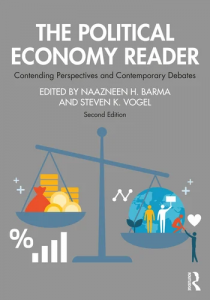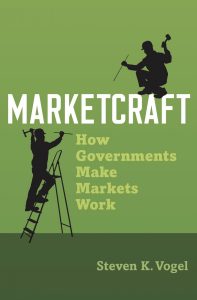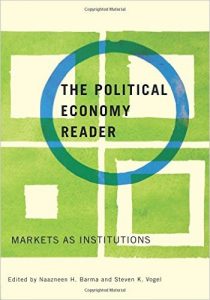
This reader advocates a particular approach to the study of political economy – the “market-institutional” perspective – which emphasizes the ways in which markets are embedded in political and social institutions. This perspective offers a compelling alternative to the market-liberal view, which advocates freer markets and less government intervention in the economy, as if states and markets were naturally at odds with each other. The reader embraces a truly interdisciplinary approach to the study of political economy, with extensive coverage from sociology, economics, history and political science. It includes some of the most important classical and contemporary theoretical perspectives on political economy. And it engages some of the most topical debates in political economy today, such as climate change, the global financial crisis, inequality, the digital platform economy, and the COVID-19 pandemic.
Modern-day markets do not arise spontaneously or evolve naturally. Rather they are crafted by individuals, firms, and most of all, by governments. Thus “marketcraft” represents a core function of government comparable to statecraft and requires considerable artistry to govern markets effectively. Just as real-world statecraft can be masterful or muddled, so it is with marketcraft. Marketcraft builds upon the recognition that all markets are crafted, then systematically explores the implications for analysis and policy. It examines a wide range of policy issues to support this perspective, focusing in particular on the US and Japan. Itexamines how the US, the “freest” market economy, is actually among the most heavily regulated advanced economies, while Japan’s effort to liberalize its economy expanded the government’s role in practice. Marketcraft demonstrates that market institutions need government to function, and in increasingly complex economies, governance itself must feature equally complex policy tools to meet the task. In our era—and despite what anti-government ideologues contend—governmental officials, regardless of party affiliation, should be trained in “marketcraft” just as much as in statecraft.
Suzanne Hall Vogel demonstrates that the role of the professional housewife constrained Japanese middle-class women in the postwar era, and yet it empowered them as well. Japanese housewives had remarkable authority and autonomy within their designated realm, with women focusing on the home and children while men focused on work. Wives and mothers now have more options than their mothers and grandmothers did, but they find themselves unprepared to cope with this new era of choice. Three biographies poignantly illustrate the strengths and the vulnerabilities of professional housewives and of families facing social change and economic uncertainty in contemporary Japan.
This course reader is designed for advanced undergraduate courses in a variety of disciplines, but it is also appropriate for graduate seminars. It contends that markets should be viewed as institutions that are deeply embedded in politics and society, combining a theoretical approach to understanding capitalism with analyses of real-world market systems around the world today. It includes core writings on political economy from four social science disciplines: economics, political science, sociology, and history. It first lays the conceptual groundwork, covering transaction costs, property rights, corporate governance systems, power relationships, social networks and cultural norms, and then turns to real-world practices and reforms. Contemporary debates focus on regulatory reform in advanced industrial countries, market transition in post-communist economies, and market development in less developed countries. The volume concludes with selections on the information technology revolution and globalization.
As the Japanese economy languished in the 1990s, Japanese government officials, business executives, and opinion leaders concluded that their economic model had gone terribly wrong. Despite popular perceptions to the contrary, Japanese government and industry enacted substantial reforms. Yet Japan never emulated the American model. As government officials and industry leaders scrutinized their options, they selected reforms to modify or reinforce preexisting institutions rather than to abandon them. This book explains the nature and extent of these reforms and why they were enacted, comparing Japan to the United States and Germany, and comparing across issue-areas, industrial sectors, and companies within Japan. The cumulative result of many small adjustments is a substantially redesigned Japanese economic model characterized by more selectivity in business partnerships, more differentiation across sectors and companies, and more openness to foreign players.
Steven K. Vogel, ed., U.S.-Japan Relations in a Changing World (Brookings, 2002)
This book evaluates the changing relationship between these two powers, providing in-depth analysis on a variety of topics. It scrutinizes the historical context, providing the reader with predictive tools for understanding events as they unfold. Instead of looking at the U.S.-Japan relationship one issue at a time, it examines specific trends and then analyzes how these trends affect the relationship as a whole. This innovative approach allows the reader to view several perspectives simultaneously, and it compels the contributors to assemble clear causal arguments that detail what each factor can and cannot explain. The result is a cogent and convincing appraisal of the status and future of U.S.-Japan relations after fifty years of peaceful coexistence.
The United States, Western Europe, and Japan have transformed the relationship between governments and corporations since the 1980s. This book dispenses with euphemisms and makes sense of this transformation. It contends that the deregulation revolution of the 1980s and 1990s never happened. The advanced industrial countries moved toward liberalization or freer markets at the same time that they imposed reregulation or more rules. Moreover, the countries involved did not converge in regulatory practice but combined liberalization and reregulation in markedly different ways. The state itself, far more than private interest groups, drove the process of regulatory reform. Thus, the story of “deregulation” is one rich in paradox: a movement aimed at reducing regulation increased it; a movement propelled by global forces reinforced national differences; and a movement that purported to reduce state power was led by the state itself. The book compares regulatory reform in Britain and Japan, with special attention to the telecommunication and financial services industries. It also reviews other sectors, such as broadcasting, transportation, and utilities; and other countries, such as the United States, France, and Germany.





